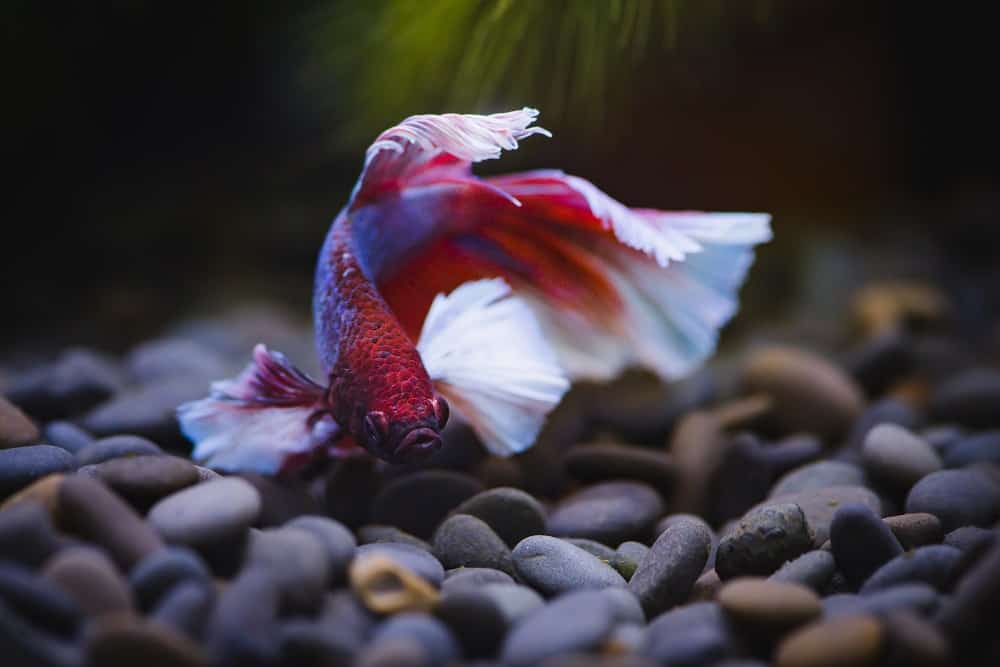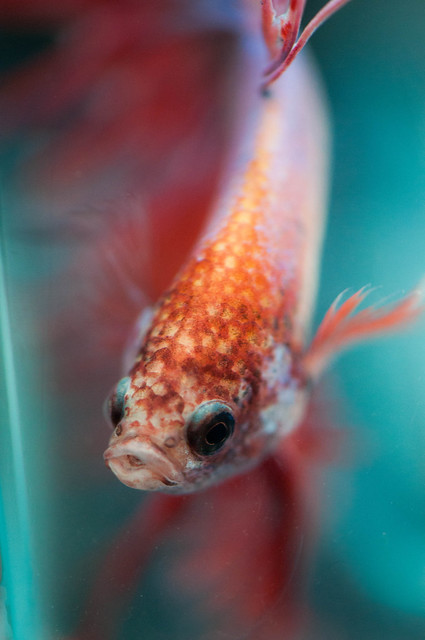If you’ve just gotten your own first Betta or maybe unfortunately just lost a fish, you might be wondering about Betta fish lifespan. How long do Betta fish live? How old do they get and what influences their survival?
In this article we’ll give you the short answer first and then go into factors that affect Betta fish lifespan. Additionally, there’s a list at the bottom of the post describing what you can do yourself to make sure your fish lives a full, healthy life.
Note: Your Betta can only live a full, healthy life in a cycled and heated aquarium. If you’d like to know more about a healthy environment for a Betta fish, check out why Betta bowls are bad and the general Betta fish caresheet.
How long do Betta fish live? The short answer.
The average Betta fish lifespan today is around two to three years. However, since many Bettas you get from pet stores are at least already six months old or more, you’d be very lucky to keep yours for two years.
Nowadays, many people struggle to even keep their Betta fish happy and healthy for a year or year and a half, despite proper care and clean water. This is worrying to many hobbyists, since it seems that the average Betta fish lifespan is dropping. You still hear a lot of people saying that they’ve had (or still have) a Betta fish live for four or five years. This is absolutely feasible but is no longer the norm.

Did you know? When you see older Betta fish, they interestingly tend to be of the veil tail variety. There is some speculation that the red and blue veil tail Bettas are the hardiest and live longest simply because they haven’t been selectively bred as extensively. Basically, they’ve been ‘tampered’ with less than some designer Betta varieties.
What affects the average Betta fish lifespan before you even get the Betta?
Even if you give your Betta the best care possible, you may still find your fish belly-up seemingly before its time. That’s because there are so many other factors at play that are out of your control.
Here are just some factors that affect how long Betta fish live:
- Quantity over quality. Given their popularity, it’s not surprising that Bettas are often bred and kept in the thousands in large commercial farms. Since tropical fish are often bred for quantity and not quality, many Bettas that should not have been sold still end up in pet stores.
- In fact, commercial Betta breeders even tend to sell clearly deformed Bettas with terrible genes under catchy commercial names! For example, some Bettas with massive tumors on their heads have been sold as “oranda” Bettas (in reference to oranda goldfish with their large head growths). Obviously, not all commercial farms are bad but working with so many fish at once for profit has its cons. Profit margins are often small and it’s tempting to start skimping on the actual quality of the gene pool.

- Genetics. In addition to the ‘oranda Betta’ example above, tumors are very common in some “breeds” of Bettas. Examples are dragon scale Bettas, appreciated for their spectacular thick scaling, and marble Bettas with excessive white scaling.
- So why do we still breed these problematic varieties en masse? Simply because they are attractive fish. It’s because we breed for flashiness above function that Betta fish now have so many health issues. After all, a lot of line-breeding (inbreeding) has to be performed to make certain new and desirable traits stable. Rosetail Bettas are a good example of what happens when line-breeding and focusing on a sole physical trait is taken too far.
- Power growing. When it comes to mass-producing Bettas, the faster you can get your fish on the market, the better. A lot of farms and breeders grow their fish as big as possible as quickly as possible by raising their fish in high water temperatures and feeding them a high-protein diet of beef heart.
- It’s already well known that keeping Bettas in consistently high temperatures can negatively affect Betta fish lifespan. A diet of warm-blooded animal meat is also not recommended, as it’s too fatty for Bettas and can cause health issues.
What affects Betta fish lifespan after you get the Betta?
It’s still a sad fact of life that many people don’t know how to properly care for Betta fish and buy them on a whim as an “easy” or “disposable” pet. So many people still buy into the myth that Bettas can live in a plain fishbowl, for instance. While they can survive, they won’t thrive.
In this day and age, with so much information available at your fingertips, it’s disheartening when people don’t do their research before bringing a Betta fish, or any other kind of animal, home. A lot of people still think that the average Betta fish lifespan is only a month.
Here are factors that you can control that affect how long Betta fish live:
- Tank size. Avoid those 0.5 gallons “tanks”, “aquaponics Betta vases” and other gimmick products at all costs. They are no better than the plastic cups Bettas sit-in at pet stores. Additionally, they’re needlessly expensive when you could spend the same amount of money on large plastic tubs or secondhand glass tanks. Aim for at least 5 gallons as a minimum since it gives the Betta lots of room to exercise and the water chemistry is much more forgiving.
- Heating. Betta fish are tropical fish that need warm water to thrive, so an aquarium heater is a must. The average room temperature is only 68 degrees Fahrenheit (20 °C) and these little guys need between 76 to 80 (24.5 to 26.5 °C) to be in good health.
- Diet. Variety is the spice of life! Just like you would with a cat or dog, look at the ingredients on your fish food and aim for foods high in crude protein and low in fillers. Try to avoid flaked foods since they create a lot of waste. If you’re not sure what works and what doesn’t, try having a look at the article on feeding Betta fish to clear things up.
- Exercise. One of the things that are often overlooked with Betta fish care is keeping the fish active. Nowadays, one of the silent leading causes of death in Betta fish is the fatty degeneration of the organs. Our aquariums are simply not as large as a wild Betta’s habitat and there are no bugs to chase around nor competitors to impress.
- To avoid an obese Betta, try making your it work a bit harder for its food (the occasional live food helps if you don’t overdo it!) and decorate the tank heavily to give it plenty of things to explore. Most importantly, don’t go for a tiny tank that has no swimming space.
- Water changes and general maintenance. The hardest part about keeping Betta fish is keeping water! Make sure you learn about the nitrogen cycle and how to establish one in your aquarium. If you don’t have that covered, chances are great that your Betta will pass away within a few weeks or at least sustain permanent health damage.
- Once cycling is done done, be sure to have water testing equipment on hand and do water changes once or twice a week, including siphoning the substrate and checking the filter. Having clean, warm water is essential to extending the average Betta fish lifespan.
- Medications. Only use medications if you’re absolutely sure about what you’re dealing with. In a lot of cases, minor Betta illnesses can be managed simply by upping water changes, tweaking temperature and maybe adding a touch of aquarium salt.
If you have any more questions about Betta fish lifespan or want to share your own experiences with these feisty little fish, don’t hesitate to leave a comment below. If you’d like to read more about Bettas and their care, head over to the Betta category for many more articles!




The betta’s lifespan has always been my doubt. I am interested in creating the betta fish that will have a long life if the conditions of the aquarium are correct. This information is very good. Thanks.
Honestly, betta fish lifespans are kind of all over the place. Some people only have them for a few months while others have them for close to a decade. There are a lot of factors that go into it, like the breed of betta and the conditions they’re kept in.
In general, though, you can expect to have your betta for at least a couple of years.
I was considering a betta for a 5 gallon tank I’m working on, but after reading all this, I think I’ll have to skip getting one. I figured breeding practices weren’t the best, but I didn’t know it was this bad. Dwarf shrimp were another idea, I hope they’re at least a little more ethically bred…
Yes, unfortunately, a lot of the more desirable fish (for beauty and for scientific research) have been modified in some way. Like anything, it more so depends on if you chose to support commercial businesses or independent ones where you know their practices :-).
I knew the living space issue was a big problem but nothing about the mass breeding/resulting health issues. I’ve always considered them a hearty fish and ours have always lived for years. Even the one I accidentally put down the bathroom sink . . . had to get it out of the pipes. Now I’m wondering if I should get our next one from the pet store, which I consider a rescue, or get one from a higher quality source.
This is honestly a difficult question to answer. By buying a betta from a pet store chain, you’re supporting poor conditions and prolonging the practice, but you’re also letting those fish suffer longer. If you can, I would go to a family-owned business and support them instead.
You’re going to have to tell us about the bathroom sink incident! It really is crazy how much animals can endure sometimes.